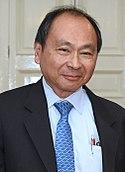Francis Fukuyama Quote
The great concentration of wealth in the hands of the owners of chaebol has also had the consequence feared by the KMT in Taiwan: the entry into politics of a wealthy industrialist. This happened for the first time with the candidacy of Chung Ju Yung, founder of Hyundai, for president in the 1993 election. There is, of course, nothing wrong with a Ross Perot-style billionaire’s entering politics in a democracy, but the degree of concentrated wealth in the Korean business community has made other political actors on both the right and the left nervous. The result for Korea thus far has not been propitious; while losing the election to Kim Young Sam, the seventy-seven-year-old Chung was jailed in late 1993 on rather specious corruption charges—a warning to all would-be politicians among the business class that their participation in politics would not be welcome.74 Despite the apparent anomaly between its Chinese-style familistic culture and its large corporations, Korea continues to fit my overall hypothesis. That is, Korea, like China, is a familistic culture with a relatively low degree of trust outside kinship. In default of this cultural propensity, the Korean state has had to step in to create large organizations that would otherwise not be created by the private sector on its own. The large Korean chaebol may have been run more efficiently than the state-owned companies of France, Italy, and a number of countries in Latin America, but they were no less the product of subsidy, protection, regulation, and other acts of government intervention. While most countries would be quite happy to have had Korea’s growth record, it is not clear that they could achieve it using Korean methods.
The great concentration of wealth in the hands of the owners of chaebol has also had the consequence feared by the KMT in Taiwan: the entry into politics of a wealthy industrialist. This happened for the first time with the candidacy of Chung Ju Yung, founder of Hyundai, for president in the 1993 election. There is, of course, nothing wrong with a Ross Perot-style billionaire’s entering politics in a democracy, but the degree of concentrated wealth in the Korean business community has made other political actors on both the right and the left nervous. The result for Korea thus far has not been propitious; while losing the election to Kim Young Sam, the seventy-seven-year-old Chung was jailed in late 1993 on rather specious corruption charges—a warning to all would-be politicians among the business class that their participation in politics would not be welcome.74 Despite the apparent anomaly between its Chinese-style familistic culture and its large corporations, Korea continues to fit my overall hypothesis. That is, Korea, like China, is a familistic culture with a relatively low degree of trust outside kinship. In default of this cultural propensity, the Korean state has had to step in to create large organizations that would otherwise not be created by the private sector on its own. The large Korean chaebol may have been run more efficiently than the state-owned companies of France, Italy, and a number of countries in Latin America, but they were no less the product of subsidy, protection, regulation, and other acts of government intervention. While most countries would be quite happy to have had Korea’s growth record, it is not clear that they could achieve it using Korean methods.
Related Quotes
About Francis Fukuyama
Fukuyama is best known for his book The End of History and the Last Man (1992), which argues that the worldwide spread of liberal democracies and free-market capitalism of the West and its lifestyle may signal the end point of humanity's sociocultural evolution and political struggle and become the final form of human government, an assessment met with numerous and substantial criticisms. In his subsequent book Trust: Social Virtues and Creation of Prosperity (1995), he modified his earlier position to acknowledge that culture cannot be cleanly separated from economics. Fukuyama is also associated with the rise of the neoconservative movement, from which he has since distanced himself.
Fukuyama has been a senior fellow at the Freeman Spogli Institute for International Studies since July 2010 and the Mosbacher Director of the Center on Democracy, Development and the Rule of Law at Stanford University. In August 2019, he was named director of the Ford Dorsey Master's in International Policy at Stanford.
Before that, he served as a professor and director of the International Development program at the School of Advanced International Studies of Johns Hopkins University. Previously, he was Omer L. and Nancy Hirst Professor of Public Policy at the School of Public Policy at George Mason University.
He is a council member of the International Forum for Democratic Studies founded by the National Endowment for Democracy and was a member of the Political Science Department of the RAND Corporation. He is also one of the 25 leading figures on the Information and Democracy Commission launched by Reporters Without Borders. In 2024 he received the Riggs Award for Lifetime Achievement in International and Comparative Public Administration.
